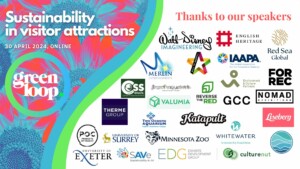The Shark Trust Celebrates 20 years in 2017 – and has big plans for the next 10 years and beyond.

The Shark Trust is dedicated to safeguarding the future of global shark populations. Paul Cox, Managing Director of the Shark Trust, spoke to Blooloop about his background, the Shark Trust, and the key issues facing sharks.
Cox became Managing Director of the Shark Trust in January 2015. He was charged with leading the successful charity’s next phase of growth. This involves generating new revenue, developing the Trust’s public profile and expanding outputs over the next decade.
From The City to Conservation – an Unconventional Background
Cox started off working in banking in the 90s. He developed an interest in zoology, and marine life in particular through what he calls ‘the usual routes’ – snorkelling, diving, aquarium visits, TV and magazines. But it was a memoir called Sea Change that inspired him to change career. The book was written by Sylvia Earle, former chief scientist of the National Oceanic and Atmospheric Administration. In it she makes an urgent plea for the preservation of the world’s deteriorating ocean ecosystems.
Cox left his job, retook his A levels and studied Marine Biology at the University of Plymouth. He then took a Masters at the University of the West of England in Science Communication.
“While I was doing my degree, I started working at the National Marine Aquarium in Plymouth,” says Cox. “That was really when I became interested in how communication can be used to drive conservation change. After I graduated I was lucky enough to get a job there and I worked there for 15 years.”

Learning to Love Sharks
He was Head of Science and Learning at the National Marine Aquarium from 2007 until 2012. Here he led both formal learning and the informal learning output of the Aquarium. He played a pivotal role in re-aligning the business strategy and re-focusing the organisation. This involved developing external partnerships and attracting around £750,000 in external capital to support charitable initiatives.
From 2012, Cox became Director of Conservation and Communication at the Aquarium, expanding the conservation output and leading local and national education initiatives. His campaigns also achieved significant success in influencing sustainable seafood consumption across the city of Plymouth.
While working at the Aquarium Cox became captivated by the sharks. “You can’t ignore them,” he says. “They are fascinating and thrilling and beautiful. They were always the most popular animals, the most interesting ones.”
When the job at the Shark Trust came along, Cox had no doubts. “I couldn’t really pass it up,” he says.
Conservation and Public Engagement – Working on Two Levels to Educate and Conserve
“The Shark Trust is a two-headed beast,” Cox explains. “Conservation and public engagement.”

As far as conservation goes, the Trust has three core conservation goals. Firstly, there’s the protection of endangered shark species. Secondly, they advocate sustainable management of fisheries for non-threatened species. Thirdly, they work on responsible trade and consumption of shark products. “That involves policy advocacy work, working with stakeholders,” says Cox. “That could be the fishing industry, or the retail chain, eco-tourism, or policymakers. It’s about working with them to create positive change.”
As for public engagement work, the aim is to get everyone fired up about shark conservation. “That’s where the aquariums come in. We don’t have a place where people can come to see us, but we do have the aquariums. They are really the touchpoint between us and our audience.” He explains that their audience is not only big and broad: “It’s an audience that’s engaged already. They are pre-primed to hear our messaging.”
The Effects of the EU Referendum
The Shark Trust evolved out of the Biodiversity Convention in Rio in 1992. This dictated that countries should develop a plan of action to protect sharks. Initially it was set up as a charity to assist the government.
“It has grown from there,” says Cox. “Initially it was very UK shark-based. Then it became more engaged in fisheries issues.” Working at EU level was a natural progression. Now the Trust works with global partnerships on a wider scale around global issues.
The result of the EU referendum vote came as something of a surprise. “The UK has always been a champion of shark conservation,” says Cox. “It has really led the way in terms of leading the EU to a stronger shark conservation position.” The EU, in turn, is now quite proactive globally. Cox feels the UK can take a lot of credit for this.
However now there are concerns about the future. “There was – and is – this worry with Brexit that we might lose our negotiating power with the EU,” says Cox. “There’s also question about whether the UK could maintain the strength of the position it has adopted over the last 20 years.”
A lot of issues are still up in the air. “Our sense at the moment is that there are opportunities as well as challenges. We just have to make sure that we take advantage of the opportunities, and downplay the challenges.”

Sharks are a Key Part of the Ocean Ecosystem but are Vulnerable
As apex predators, sharks fulfil a vital role in maintaining balance by keeping other populations in check. However their slow growth, late maturity and few offspring leave them vulnerable.
“Sharks face the common issues that all life in the ocean faces,” says Cox. “Some sharks may be vulnerable to habitat destruction, or coastal development. Some sharks will be vulnerable to pollution, and plastics in the ocean. But the biggest threat to sharks is fisheries.”
He explains that this specifically involves overfishing or fishing beyond the level where sharks can reproduce. “Overfishing is considered to be biggest threat so that’s the thing we have to challenge head-on.”
Changes in Legislation can Protect Sharks

Sharks are in a threatened category. The Shark Trust advocates changes in legislation to protect them. Cox explains that, in the UK, the Wildlife and Countryside Act offers a high level of protection. “This prevents commercial fishing, recreational angling, any kind of interference with the animals. It’s a heavy level of protection which is rarely applied. It was applied to the basking shark about 20 years ago, because their population around the UK was under particular threat.”
Beneath this level is fisheries management. This ensures that, when shark are fished, it’s with catch limits and sustainable management. “They have to be fished at a level which isn’t going to threaten the future of that stock,” says Cox. “There’s a whole range of advocacy work right from the multinational level about protection and fisheries management.”

Sharks are Charismatic and Compelling but do they Have an Image Problem?
Are sharks a victim of their public profile? “There is some misinformation that goes out through the press,” says Cox. “There is sometimes a rather sensationalist, narrow approach to talking about sharks.” He points out that the number of sharks taken in fisheries is very high while the number of people that are attacked by sharks is very low.
“I think we in the sector need to talk more about the diversity of sharks,” says Cox. “We need to talk about their role and how important they are to the ecosystem. We also need to talk about how they make us feel in their domain. Maybe we have to be a bit more emotional about it.”
Cox says there is an interesting dichotomy about sharks. “They’re fascinating, and people want to know about them,” he says. “But they also suffer from a bad reputation sometimes. It is not really well-deserved.”
Raising Revenue a Constant Challenge
 The Shark Trust is a conservation charity which relies on donations. Raising revenue can occasionally be difficult. “There is generosity out there in the world,” says Cox. “We do have some very loyal supporters for whom we are always grateful.”
The Shark Trust is a conservation charity which relies on donations. Raising revenue can occasionally be difficult. “There is generosity out there in the world,” says Cox. “We do have some very loyal supporters for whom we are always grateful.”
However, as he points out, shark conservation is relatively niche. “It’s a subsection of marine conservation, which is a subsection of wildlife conservation. This, in turn, fits into wider environmental concerns. Inevitably there are relatively few people who are sufficiently moved to give their hard earned money. It is a challenge. But it is one that we relish.”
The Oceans are in Crisis but the Message is Positive
The Shark Trust constantly has to refresh their message. They also work on renewing educational initiatives. “We have to keep evolving if we want to get our message across,” says Cox. “We have to look at how we communicate with the world, and how we look at our different audiences. Everything is becoming more personalised in terms of communication. We must keep up with that and keep ourselves – and sharks – relevant.”
The oceans are, we know, in a state of crisis. However Cox is optimistic that the situation can be resolved and that an optimistic stance is imperative. “We can’t go around saying we’re doomed, that everything is awful, and it’s all your fault. If we do, the chances of getting support are not going to increase. We have to present an optimistic viewpoint.”
He points out that there is genuine cause for optimism. “There is a lot of positive movement,’ he says. “There are huge advances in technology that allow us to monitor things. We are seeing sweeping changes in terms of marine protected areas. Look at political will, at public engagement – a lot of positives. We have to focus on that and keep telling positive stories. Success stories need to be shouted from the rooftops.”

Global Partnership Report Shapes Conversation Work for the Coming Decade
Last year the Shark Trust worked on a report with a global partnership. “We worked with other significant shark focused organisations: Shark Advocates International, TRAFFIC, Wildlife Conservation Society (WCS), and WWF,” says Cox. “There was technical guidance and input from the International Union for Conservation of Nature (IUCN) Shark Specialist Group.”
This assessed the state of sharks and rays, and what the priorities would be for the next 10 years. ”A very interesting report has been put together,” says Cox. “It will really shape where we go next, in terms of our conservation work in the coming decade.”
He feels that the document delivers real hope and a clear plan for conservation. “It implies that it’s all within our grasp. We just have to make it happen.”
He is also keen to forge more effective partnerships with aquariums, and with other people and groups in general. “We need to communicate with the world. We need to draw more people towards what we are doing. We’ve got to get people engaged in whatever way we can.”
Three Calls to Action – Beyond the Great White

The Shark Trust is keen to engage the public with three clear ‘calls to action’. Cox explains that the first call is to discover more about sharks. Everyone knows about the Great White but Cox wants people to gain a broader view of the diversity of sharks.
The second call is to connect more with shark conservation, discovering more about it and bringing it into people’s lives. The third part is to do something actively.
“Everyone can do something for shark conservation,” says Cox. “The aquariums are a really vital part of that. They can help us to get our messages across through education and learning programs.”
He also feels that the Shark Trust and aquariums need to focus on how to communicate solutions alongside issues. “We need to suggest things that each individual can do to help the situation. It just seems more empowering.”
Connecting through Learning

Cox says that primary school children are a key demographic. “Worldviews are set at a very early age,’ he says. “We need to build on that.” He explains that if school children are engaged at an early age, it’s much easier to keep them interested and committed. “We’ve got to keep getting the right messaging to them as they enter their teenage years,” he adds. “We need to work out strategies so that they remain engaged.”
Cox is keen to point out that acting for change doesn’t have to involve extreme lifestyle changes.
“That action point could be taking part in a citizen science project,” he says. He cites the Great Egg Case Hunt, which has been going for the last decade. “We encourage people just to go on a beach and kick around on the strand line, and if they find an egg case, we ask them to report it. That’s an easy, fun thing for people to do. Yet, as that project builds, it is affording useful data.”
Working for Conservation in Everyday Life
“People can also help us with fundraising,” says Cox. The Shark Trust is working with Walk for Wildlife on a campaign to coordinate a mass event where schoolchildren are encouraged to do a sponsored walk to raise funds.
Another way to help is simply by choosing to buy sustainable seafood. “Somewhere down the line, that helps us in what we are trying to do,” says Cox. “It’s supporting the idea of sustainability in fisheries.”
He also points out that you don’t have to be on a boat in the Bahamas tagging sharks. You can work for conservation in your everyday life.
“We are trying to get people to discover, connect, and act. That’s our mantra.”

Images Courtesy of The Shark Trust. Main Image by Andrew Pearson.
















